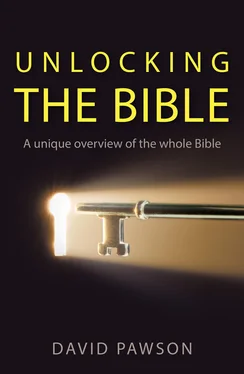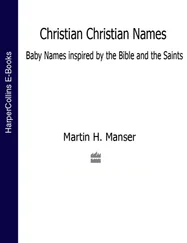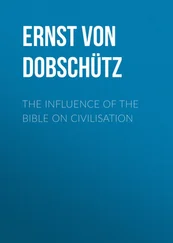We have noted already that God is the judge or deliverer of the people, since he is the only person to whom the noun ‘judge’ is applied in the book. He is the real hero, and success is achieved when the human leaders co-operate with him.
However, when we ask the question, ‘Who drove the Canaanites from the land, Israel or God?’ we must reply, ‘Both!’ We can sum up the situation like this: Without him they could not; without them he would not. On the one hand God declared that he would give them the land and drive out the inhabitants, but on the other hand he needed Israel to respond to his direction.
Furthermore, we read that in some cases God did not drive out the opposition, but left them in the land to test Israel and teach them to fight. We learn from Amos that just as God brought Israel out of Egypt, he brought the Philistines from Crete as neighbours, to inflict injury on Israel.
Within the book of Judges, therefore, we find that God chastises his people. He delivers them to evil, demonstrating his justice, as well as from evil, showing his mercy.
This principle is also seen in the New Testament. There is, of course, the line in the Lord’s Prayer: ‘Lead us not into temptation but deliver us from evil.’ The power of the Holy Spirit can heal the sick, but it can also bring disease; it can give sight to the blind, but it can also prevent good eyes from seeing; it can raise the dead, but it brings death too, as with Ananias and Sapphira. The ultimate sanction in church discipline is to hand over erring members to Satan, whose destructive power over the body may bring them to their senses and save their souls on the day of judgement.
Yet at the same time God hears the prayers of Israel and responds. He is grieved by their misery, he is patient and faithful, in spite of the people’s repeated disobedience. So we read how God answered prayer, sending anointed leaders and directing operations, for example with Gideon and Barak. We see a dynamic relationship between God and man, each affecting the other.
Noting this important dynamic still does not explain the purpose of the book, however, but this will not become truly clear until we have looked at Ruth as well. At this stage all we see is the unedifying cycle of Israel getting into and out of trouble. We do not yet know where it is going.
The reasons for these problems within Israel can be explained in two ways:
1. SECOND-GENERATION MEMBERS
The people of Israel now occupying the Promised Land did not have the same knowledge of God and what he had done for them as the previous generation. They did not want to know God. Instead they did what was right in their own eyes, but wrong in his eyes. Everyone was a law to himself.
2. SECOND-GENERATION LEADERS
There was no seamless succession in the leadership. When a judge died, there was a gap before another judge appeared, and during this gap the people reverted to the type of behaviour which led to God’s punishment. The pattern of the cycle is indicated by phrases such as, ‘as long as the judge lived … but when the judge died…’ This was very different from the dynastic succession which prevailed in other nations, ensuring continuity and stability – and the judges only ruled over a limited group, not a united nation.
This question of kingship crops up a number of times.
1 Gideon is offered the throne by his followers following his victory over the Midianites. The people ask him to start a dynasty. Some argue that he should have accepted, but clearly this is not God’s time for a king to be chosen. Gideon tells the people their problem is that they have not looked to God as their king.
2 Following Gideon the leadership is in the hands of a number of people. Abimelech asks the people whether they would prefer his sole leadership to leadership by Gideon’s 70 sons as a group. He is duly installed and proceeds to murder his brothers. Things get steadily worse as his hunger for power demonstrates that he has little interest in the welfare of the people, and he is eventually killed in battle.
3 Throughout Judges we read the refrain, ‘There was no king in those days…’ and the suggestion is that things would have been much better if there had been one.
We will return to this theme later. For now the important point to note is that Judges tells us there is a desperate need for a king. As we turn to the book of Ruth we are faced with the more positive message that a king will be provided. Ruth starts to address the question, ‘Who will it be?’
Ruth
The book of Ruth was written at the same time as Judges but there could hardly be a greater contrast between the two.
 Judges includes the stories of many people, Ruth just a few.
Judges includes the stories of many people, Ruth just a few.
 Judges is relatively large, while Ruth is one of the smallest Old Testament books.
Judges is relatively large, while Ruth is one of the smallest Old Testament books.
 Judges covers the whole of Israel, Ruth just one small town.
Judges covers the whole of Israel, Ruth just one small town.
 Judges spans 200 years, Ruth just one generation.
Judges spans 200 years, Ruth just one generation.
Ruth reads like a Thomas Hardy novel, with the sort of romance which would not be out of place in a magazine story. It is a breath of fresh air after Judges. In Judges we have mass killing, rape, a prostitute cut up into pieces, civil war, evil priests. It is just two miles from the Benjaminites’ territory to Judah where Ruth is located, but it is a totally different atmosphere.
Ruth is only four chapters long. The first two chapters are about two inseparable women, and the second two chapters are about two influential men. These four people form the main characters in the drama.
1 Mother-in-law’s loss
2 Daughter-in-law’s loyalty
3 Redeemer kinsman’s love
4 Royal king’s line
1. Mother-in-law’s loss
The story begins with a famine in Israel, which caused three men to leave for Moab. We can guess that the famine was a punishment from God, for this was a common sign of God’s displeasure, and it provides a contrast with the location of the main drama – Bethlehem means ‘house of bread’ in Hebrew.
If the family had learned the lessons from Israel’s history, they would have known that searching for food outside Israel always led to problems, as the stories of Abraham, Isaac and Jacob testify, but there is no record that they prayed to God for food. So Naomi and her husband travelled east across the hills on the far side of the Dead Sea to Moab. As time passed each of their two sons married a Moabite woman. Things went from bad to worse. Naomi’s husband died and the two sons died also. The three widows were left alone. In those days a widow’s future was bleak. The whole drama started from the men’s refusal to rely on God. They sought a human solution to their situation instead of asking God what was happening and what they should do.
God would have told them that the famine was part of his punishment, and if only they would turn back to him they would have enough food again. But they did not even wait to ask him, let alone listen for an answer.
As a result of this crisis Naomi became bitter. Her name actually means ‘pleasure’, but when she returned to Israel she was unrecognizable to her old relatives and asked to be called ‘Mara’, meaning ‘bitter’, instead. She encouraged her two daughters-in-law to stay in Moab, knowing that returning to Judah would mean little prospect of remarrying. The men in Judah were not likely to marry outside their clan.
Читать дальше

 Judges includes the stories of many people, Ruth just a few.
Judges includes the stories of many people, Ruth just a few.









